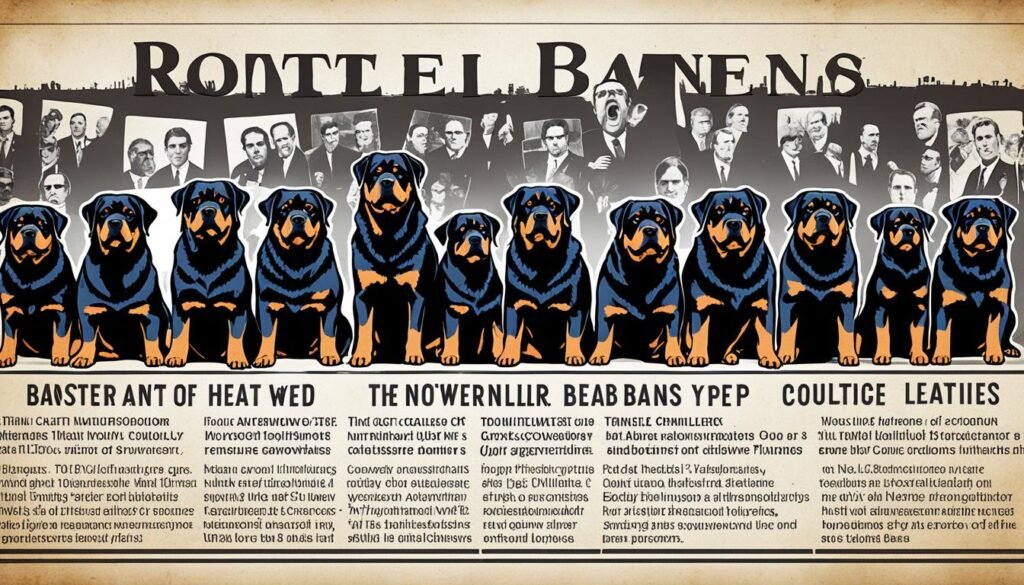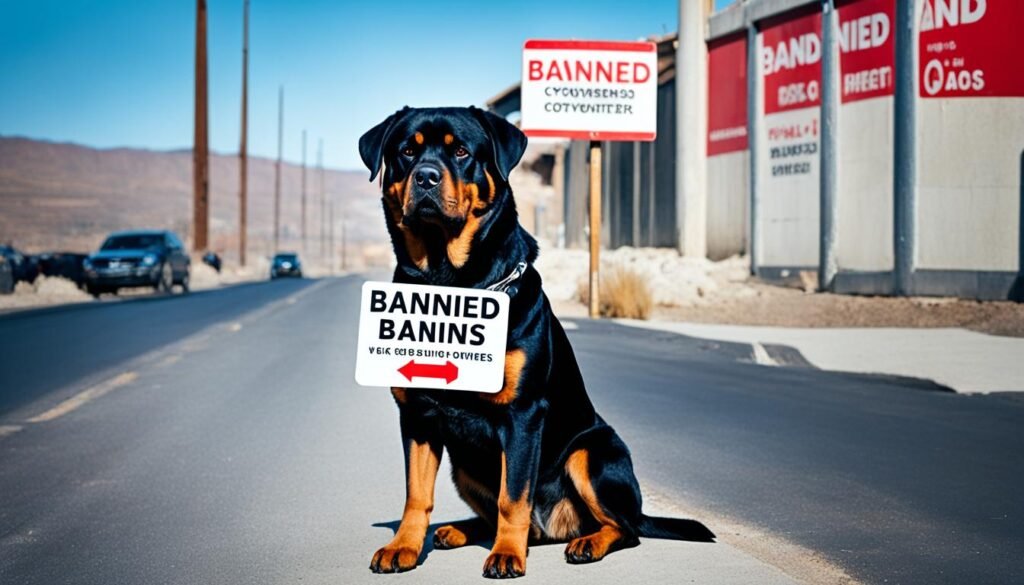Did you know that Rottweilers, known for their loyal and protective nature, have faced bans and restrictions in certain areas? The history of Rottweiler restrictions sheds light on the ongoing debates surrounding breed-specific legislation and responsible dog ownership. Let’s take a closer look at the past and current status of Rottweilers in relation to bans and restrictions.
Key Takeaways:
- Rottweilers have faced bans and restrictions in some areas due to concerns about aggression and safety.
- Military housing companies and installations have implemented breed restrictions, including Rottweilers, to prevent incidents of aggression.
- Specific breed restrictions in military housing may vary depending on the housing company and military branch.
- Advocates for banned breeds argue that the behavior of a dog should be determined by the owner, not the breed.
- Breed bans and restrictions on Rottweilers can also vary from country to country.
Breed Restrictions in Military Housing
In military housing, specific breed restrictions may vary depending on the housing company and the branch of the military. However, Rottweilers are commonly included in lists of banned breeds. Some of the other breeds that are often restricted include Pit Bulls, Staffordshire Bull Terriers, Bull Mastiffs, Doberman Pinschers, Akitas, and Chow Chows. These restrictions aim to prevent incidents of aggression and ensure the safety of residents. It’s important to check with the specific housing company or military installation for the most up-to-date information on breed restrictions.
When it comes to rottweiler breed bans, ownership regulations, and restrictions by state, military housing imposes their own rules to maintain a safe environment for residents. As Rottweilers are often included in lists of banned breeds, it’s crucial for potential owners to familiarize themselves with these restrictions.
Alongside Rottweilers, other commonly banned breeds in military housing include Pit Bulls, Staffordshire Bull Terriers, Bull Mastiffs, Doberman Pinschers, Akitas, and Chow Chows. These restrictions are imposed as a preventive measure to minimize the risk of aggression and ensure the well-being of residents.
For accurate and up-to-date information on breed restrictions in military housing, it is recommended to contact the specific housing company or military installation you are associated with. They will provide you with the necessary guidelines and details on ownership regulations.
Military Policies on Banned Breeds
The military branches have their own policies regarding banned breeds in military housing. These policies are in place to ensure the safety of residents and prevent incidents of aggression. Let’s take a closer look at the specific regulations implemented by each branch.
1. Army
The Army prohibits the presence of aggressive or potentially aggressive breeds in military housing. These breeds include Pit Bulls, Rottweilers, Doberman Pinschers, Chows, and wolf hybrids. The Army recognizes the potential risks associated with these breeds and aims to create a safe living environment for its service members and their families.
2. Air Force
The Air Force also has a similar policy on banned breeds in military housing. In addition to the breeds mentioned by the Army, the Air Force includes specific behaviors that indicate aggression. These policies are designed to ensure the well-being of individuals living in Air Force housing.
3. Navy and Marine Corps
The Navy and Marine Corps typically rely on the housing companies operating on their bases to determine breed restrictions. These housing companies have their own policies in place to regulate the presence of certain breeds. While there may not be specific breed bans at the military level, the housing companies take proactive measures to prevent aggressive incidents.
4. Coast Guard
The Coast Guard does not prohibit specific breeds in its housing policies. Instead, the focus is on instances of aggressive behavior. This allows for a case-by-case evaluation of dogs’ behavior and temperament, ensuring that only well-behaved and non-aggressive dogs are permitted in Coast Guard housing.
It’s important to note that these policies are subject to change and may vary depending on the specific regulations and guidelines of each branch. For the most accurate and up-to-date information, it is recommended to consult with the respective military branches or housing companies.
Controversies and Advocacy

The bans and restrictions on Rottweilers and other breeds in military housing have sparked controversy. Some argue that these policies unfairly target certain breeds and ignore the responsibility of owners in shaping a dog’s behavior. Advocates for banned breeds emphasize that the behavior of a dog depends on its training and socialization, rather than its breed. They highlight the need for proper education and responsible ownership to prevent breed-specific legislation.
It is important to consider the history of breed bans and ownership regulations when discussing the controversies surrounding Rottweilers. Understanding the context and reasons behind these bans can shed light on the ongoing debates and the need for more comprehensive approaches to dog ownership.
One of the main arguments put forward by advocates is that the focus should be on responsible ownership, rather than breed-specific legislation. They believe that all dogs, regardless of breed, have the potential to display aggressive behavior if not properly trained and socialized. By addressing the root causes of dog aggression, such as neglect, mistreatment, and lack of training, advocates argue that it is possible to create safer communities without resorting to breed bans.
Furthermore, there is a growing body of research that suggests breed-specific bans may not be effective in reducing dog bites and attacks. Studies have shown that factors such as owner behavior, socialization, living conditions, and training have a much greater impact on a dog’s behavior than its breed alone. This evidence supports the argument that responsible ownership, education, and prevention-focused strategies are more effective in promoting safe and harmonious communities.
Breed Bans in Other Countries

It is interesting to note that breed bans and restrictions on Rottweilers can vary significantly from country to country. One recent example is Egypt, where a new law was enacted to ban several dog breeds, including Rottweilers, due to safety concerns. Only select breeds are permitted, but only after a rigorous licensing process. This demonstrates the strict regulations and precautions that some countries have in place when it comes to dog ownership.
Similarly, other countries may have their own set of regulations and restrictions on Rottweilers and other breeds. These laws aim to ensure public safety and prevent potential incidents involving aggressive dogs. As a responsible potential Rottweiler owner, it is crucial to thoroughly research and understand the specific laws and regulations in your country or region before considering ownership.
Staying informed and educated about the legal landscape surrounding Rottweilers is essential to navigate the complexities of breed-specific legislation in different countries. By understanding the regulations and taking the necessary steps to comply with them, you can approach Rottweiler ownership responsibly and confidently.
Regional Variations in Breed Bans
- Some countries completely ban specific breeds, including Rottweilers, due to concerns about public safety.
- Other countries may have a licensing process or specific requirements for owning certain breeds, including Rottweilers.
- It is crucial to research and understand the laws and regulations in your specific country or region before getting a Rottweiler.
Owning a Rottweiler in Non-Restricted Areas

In areas where there are no specific breed bans or restrictions on Rottweilers, individuals can legally own and keep these dogs as pets. However, responsible ownership is still essential.
Rottweilers are powerful and intelligent dogs that require proper training, socialization, and exercise. It is important for owners to understand and meet the needs of the breed, while also ensuring the safety and well-being of their dog and those around them.
In non-restricted areas, Rottweiler owners have the freedom to enjoy the companionship of this loyal breed without any legal hindrances. However, it is important to recognize the responsibility that comes with owning a Rottweiler and to provide them with the care, attention, and training they require.
Conclusion
The history and current status of Rottweilers in relation to bans and restrictions highlight the ongoing debates surrounding breed-specific legislation. While some regions have implemented regulations due to concerns about aggression, there is a growing argument that responsible ownership and proper training are more effective in ensuring the safety and behavior of dogs.
For potential Rottweiler owners, it is crucial to be aware of the specific regulations in their area and approach dog ownership responsibly. This includes investing in training, socialization, and understanding the unique needs of the breed. By doing so, owners can create a safe and harmonious environment for themselves, their Rottweiler, and the community.
While there have been instances of Rottweiler bans and restrictions, it is important to recognize that the behavior of a dog is shaped by various factors, including training, environment, and owner responsibility. Breed-specific legislation may not necessarily lead to improved safety, and alternative approaches such as education and responsible ownership can be equally effective.
In conclusion, the debate surrounding Rottweiler ownership regulations continues, with advocates emphasizing the importance of addressing behavior concerns through responsible ownership. As potential Rottweiler owners, it is our responsibility to be informed, educated, and committed to providing a loving and safe environment for our furry friends.
FAQ
Have Rottweilers ever been banned?
Yes, there have been instances where Rottweilers have faced bans and restrictions.
What are breed restrictions in military housing?
In military housing, certain privatized housing companies and military installation policies have banned breeds such as Rottweilers due to concerns about dog bites and attacks.
What are the military policies on banned breeds?
Specific breed restrictions may vary depending on the housing company and branch of the military, but Rottweilers are commonly included in lists of banned breeds.
What are the controversies and advocacy surrounding Rottweiler bans?
The bans and restrictions on Rottweilers and other breeds in military housing have sparked controversy, with advocates arguing that a dog’s behavior should be determined by the owner, not the breed.
Are there breed bans in other countries?
Yes, in certain countries, including Egypt, there are breed-specific laws that ban Rottweilers and other breeds due to safety concerns.
Can Rottweilers be owned in non-restricted areas?
Yes, in areas where there are no specific breed bans or restrictions, individuals can legally own and keep Rottweilers as pets.
What is the conclusion regarding Rottweiler bans?
The history and current status of Rottweilers in relation to bans and restrictions demonstrate the ongoing debates surrounding breed-specific legislation. Responsible ownership and proper training are emphasized as essential.
